The Invaders/The Penthouse Suite
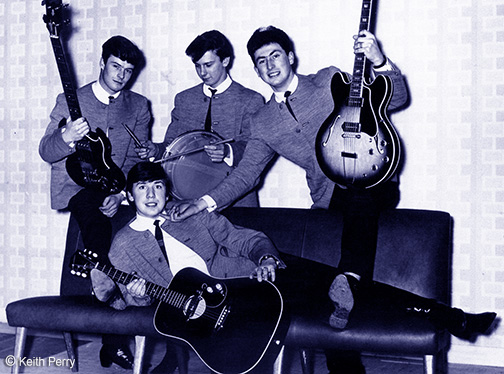
WEDNESBURY
Revised April, 2020
Keith Perry lead guitar
John Robinson lead vocal, rhythm guitar
Simeon "Sam" Whitehouse bass guitar (left 1966)
Peter Fellows drums (left 1964)
David Williams drums (joined 1964, left 1966)
Martin De-Vries bass guitar (joined 1966)
Gary James Huntbatch drums (joined 1966)
"Cliff and The Shadows" followed by "The Beatles" were an influence on so many budding young musicians during the early 1960s when the prospect of leaving school and getting a full-time job loomed large on the horizon.
Engineering apprentice Keith Perry aspired to more than just the daily grind and soon found others who thought likewise. He went on to form "The Invaders" and shared billing with The Kinks, The Zombies, The Move, Lord Sutch, and other famous names. BrumBeat contributor Brian Nicholls interviewed Keith and has written his story as follows;
"Why don't we form a group?"
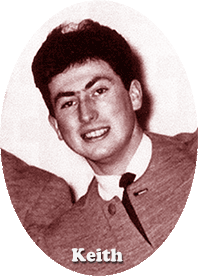
At 8.30am on the 31st August, 1959, Wednesbury school leaver Keith Perry, along with a group of other lads, were joining the first-year induction training programme for an eventual five-year engineering apprenticeship at F.H. Lloyds where initially they would all be earning just two pounds, fifteen shillings and eight pence for a forty four hour week! It was here that Keith was to meet an equally aspiring musician named Simeon Whitehouse.
Progressing from basic skills training to the adult world machine shop in year two, the pair fortunately found themselves together again in year three as trainee draughtsmen in the drawing office where they chatted incessantly about the stars and their guitars and again even more so when attending day release at Wednesbury Technical College. There they could sit together during lessons and pass notes to each other. At some point, it was Keith who suggested to Simeon (Sam)... "Why don't we form a group?"
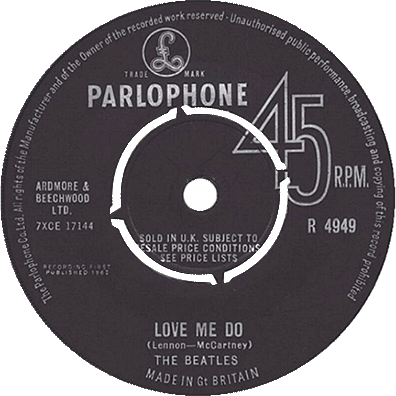
Of course, Sam jumped at the chance with the suggestion that a friend of his, Peter Fellows, would definitely be interested. Keith said that he also had a friend, John Robinson, with a great singing voice who would be interested. Coincidentally, 1962 was the beginning of what has become to be known as, "The Beat Boom" due to the back-to-basics musical trends emanating from Liverpool, Manchester, Birmingham and London.
In Liverpool however, The Beatles were riding high with their first single so, a new phenomenon called "The Mersey Sound" emerged which also embraced Manchester. By 1963 it was to be The Beatles that everyone was listening to, and taking inspiration from. That was convenient because John Robinson was a huge John Lennon fan anyway on the strength of that first single, 'Love Me Do'
In March 1962, a meeting was convened at Keith's house and, as a consequence, a new Black Country group, "The Invaders" was formed. All four lads were enthusiastic and had an appetite to succeed but, although they had an identity and vision, there remained a few significant hurdles to overcome. First they had to decide, who was going to play what, second how are we going to obtain all the necessary equipment and thirdly, none of us can play a musical instrument yet! These sort of dilemmas were happening throughout Britain at that time.
"I'll play bass" chirped Sam Whitehouse. That was good because at the time, nobody really wanted to play bass back then. It was not considered as 'cool' as a guitar and, to quote Paul McCartney when John Lennon was busy allocating roles for his soon to be fab four... "But John, the bass is always played by a fat bloke at the back!"

John Robinson (having a good singing voice) was anointed anyway but, as an added bonus, he also offered to play rhythm guitar. Peter Fellows said that he'd always fancied being a drummer so, by default, Keith Perry was unanimously elected lead guitarist. As an aside, Sam always good at maths, also took on the financial role of book keeper.
The first hurdle was to hunt for inexpensive, preferably second-hand equipment and The Invaders were quite successful in this quest. Keith obtained a Hofner 'Verithin' guitar, John a Hofner 'Jumbo' acoustic guitar. Peter got a small standard Premier drum kit and Sam, a Burns electric bass.
All these, including John's microphone, were plugged into an ever suffering 17 watt two speaker Watkins 'Dominator' amplifier via a Watkins 'Copycat' echo unit. As lead guitarist, Keith featured in three Shadows numbers - 'Apache', 'FBI' and 'Wonderful Land' where the echo unit really came into its own for an authentic Hank Marvin sound.
Keith Perry takes up the story; "Most of the stuff we all liked only needed three or four chords so with a simple rudimentary driving beat from the drums and bass we could, and did, eventually make a convincing case for plenty of return bookings in and around the Black Country. We practised individually at home in order to learn to play our selected instruments and, at the same time, rehearsed as a group every week at "The Horse and Jockey" pub in Wood Green Road, Wednesbury."
"we were now earning more than we did from our day jobs"
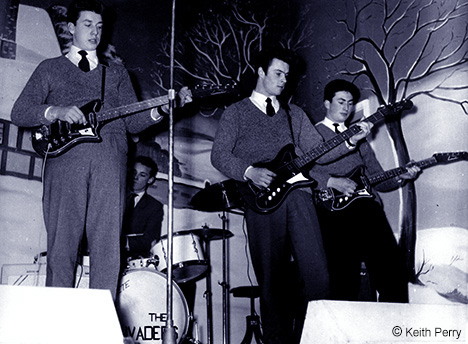
"On the 18th December, 1962 we'd only been both learning our instruments and rehearsing for nine months but, we took a leap of faith and accepted our very first booking at St James' Youth Club, St James' Church Hall, Wednesbury playing our two new Burns guitars and a Burns bass for which we were paid the princely sum of two pounds or, ten bob each for what was a nerve wracking experience."
"As stage attire we chose jumpers and slacks but later we wore Beatles-style collarless jackets. Our manager was John's dad Ben Robinson who did us all proud over the following six and a half years. In 1963 we part exchanged my Burns guitar and Sam's Burns bass for a Fender 'Stratocaster' and a Gibson EBO bass but, John liked his Burns six string and hung on to it. Peter traded his basic kit for a full pro set of Premier drums."
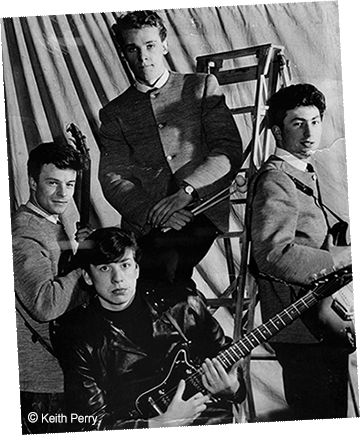
"The single Watkins amplifier and Copicat echo were replaced with VOX AC30 amplifiers and a Binson echo unit. At last we also had Shure microphones and a proper PA system. The following year I changed guitars to a Gibson 330 and Peter changed to a pro set of Rogers drums. With all the work we were attracting we could now afford to do things like that because we were now earning more than we did from our day jobs."
Their reputation reached as far as the F.H. Lloyds boardroom because the chairman's wife booked the lads for a private function at "The Hill House", Compton, Wolverhampton for her socialites.
The Invaders felt that... "the better the equipment, the better the sound"... so, in addition to the aforementioned acquisitions, plenty was also spent on other amplifiers by Selmer, Fender, Bird and Marshal in pursuit of that quest. All of the above was lugged around in a trusty Bedford van.
It was true grit and determination that drove these fledgling local groups starting with novelty gigs like fetes and charity bashes and then progressing to working men's clubs, social clubs, night clubs, pubs, ballrooms, country clubs, private functions, strip clubs and, town halls. Playing ballrooms and town halls meant you had really "made it" in the local music biz because this is where all the top British and American recording stars appeared.
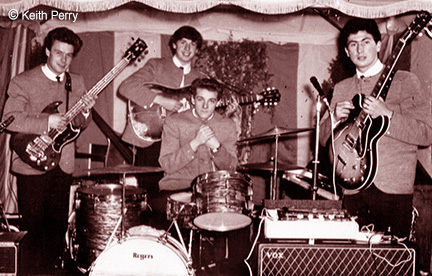
After seeing The Beatles movie "A Hard Day's Night", John Robinson became so inspired by the image of John Lennon singing and playing acoustic guitar that he switched back to his own acoustic. So, along with his collarless jacket, mop top hairstyle and adopted stance at the microphone he started to sound and even look like Lennon!
Like all young groups, they endured inevitable personnel changes. Drummer Peter Fellows left in December, 1964 to be replaced by David Williams who himself left six months later to join Dudley recording artists Finders Keepers (where he stayed until 1968).
"The Penthouse Suite"
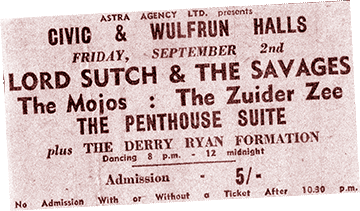
Williams was replaced by Gary Huntbatch (stage name Gary James) formerly with Steve Brett and The Mavericks. Bass guitarist Sam Whitehouse left to be replaced in December, 1966 by Martin De-Vries formerly with The Strollers and Zuider Zee.
From day one, The Invaders functioned successfully as a self-contained group with all four members playing an instrument and singing - much like The Kinks, The Beatles, The Searchers (to name but three) as opposed to the "him and them" style groups with alter ego-driven lead singers and a backing group.
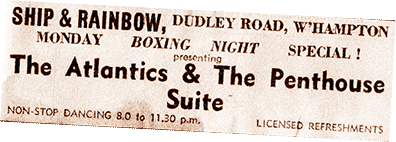
They were to go on to achieve an active life span of six and a half years when the average life of a group was just two. During that time they performed a total of 570 bookings at 227 different venues, 30 of which were at The Brunswick Arms in Wednesbury.
Notably, after their ascension to the prestigious "Ma Regan circuit" of ballrooms, they enjoyed a total of 42 bookings often sharing the billing with The Kinks, The Pete Best Group, The Pickwicks, Unit 4 plus Two, The Redcaps and Jimmy James and The Vagabonds.
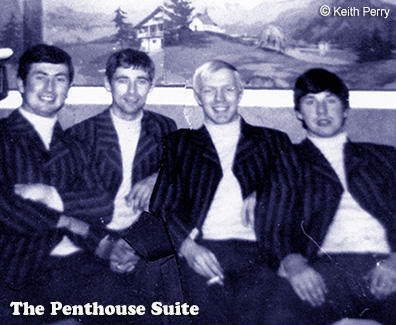
Other shared billings were The Move (Brierley Hill Youth Club), The Mojos and Lord Such and The Savages (Wolverhampton Civic Hall, The Montanas (Stage Door Club, Dudley) and The Zombies (The Spinning Disc Club, Leeds). Keith also recalled his fond memories of Wednesbury's famous "Bolero Club" with its unique Spanish themed decor.
The actual nucleus of the group was Keith Perry, John Robinson and Sam Whitehouse but, the new line up from October 1965 when they changed their name to "The Penthouse Suite" (to avoid confusion with a recording group from New Zealand also called The Invaders) was Keith Perry, John Robinson, Martin De-Vries and Gary James.
This line up remained together until they called it a day on 25th May, 1968 at their last gig at Gornal and Sedgley Labour Club. The photo is the only known remaining of The Penthouse Suite.
Gary Huntbatch emigrated to Abbotsford in British Columbia, Canada and to this day still works in the music business. Keith Perry went on to join "The Geoff Botwood Five" in 1968 and remained with them until his retirement from music in 1971.
"We never had aspirations to be famous, we just treated our music as great fun"
Keith Perry concluded; "We were conscientious to a man in professionalism and application of our music whilst working for such top local entertainment agencies as Astra, S&P Fielding Promotions, BJB Entertainments, Fryer Agency, Roger Allen Agency and Agency Supreme and still holding down our day jobs besides."
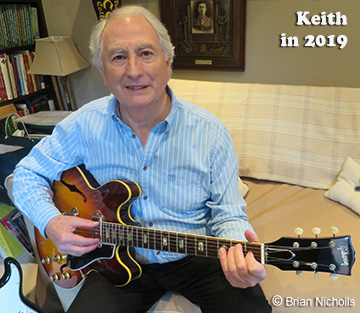
"However, in the latter years, agency jobs required you to do night clubs whose opening times were typically 10:00 pm to 2:00 am and so this was the "straw" that eventually broke the camel's back because Peter had to now work shifts and we all had responsible jobs, were married and had houses to run. We never had aspirations to be famous, we just treated our music as great fun."
Today, Keith still plays guitar and lives in a sleepy Shropshire village with his wife, Linda. He has requested this story is dedicated to the memory of Simeon Lance (Sam) Whitehouse (19 Feb, 2010 aged 65), Peter Fellows (1 June, 2012 aged 68) and, John M. Robinson (1 August, 2015 aged 70).
Copyright © Brian W. Nicholls 2019
If you would like to contribute to this page, please e-mail john@brumbeat.net